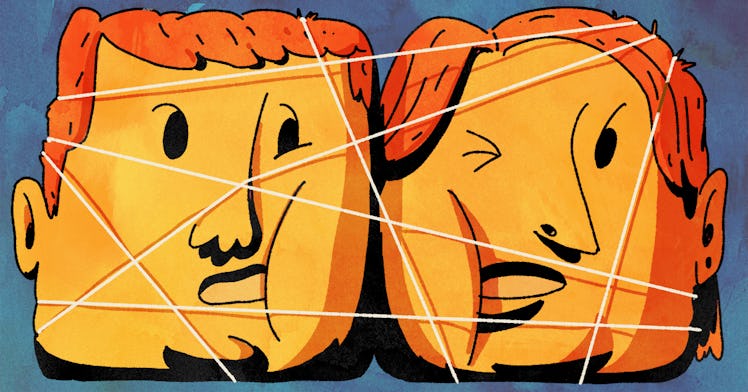Is Your Relationship Too Close For Its Own Good?
Closeness is wonderful. But when you're so close that you lose sight of your individual needs and feelings, boundaries may need to be redrawn.

Connection is part of any healthy relationship — but, then again, so are boundaries. While it’s normal to seek out closeness with a romantic partner, family member, or friend, it’s important to draw boundaries. Because too close of a relationship can have negative consequences, especially if it makes, say, you and your partner lose sight of your individual feelings or needs. This is known as an enmeshed relationship and it can lead to difficulties down the road.
While any one person can be too dependent on another, enmeshment is typically a two-way street. According to therapist Kimberly Panganiban, an enmeshed relationship usually occurs when people are so close that they are not able to attain or maintain their individuality and independence — they are tangled up or enmeshed. This dynamic is common in romantic relationships but can also occur in family units, cultural and religious groups, and even between friends, says therapist Valerie Capili.
No matter what type of relationship is affected, most forms of enmeshment have one thing in common. “These are problematic relationships because there is a lack of boundaries and attunement to one’s own self, which results in individual needs not being met,” says Panganiban.
Are You in an Enmeshed Relationship?
There are a few tell-tale signs of enmeshed relationships. Enmeshed people often avoid disagreement or conflict, experience guilt or sadness in spending time with others, use the relationship to determine their self-esteem, and feel pressure to fill a role instead of being their true selves. Enmeshed relationships also lead people to feel overly responsible for others and their feelings.
“When it is becoming increasingly difficult to function without another person, especially when a relationship is in its formative stages, it is possible that an enmeshed relationship is being established,” says Mark Borg, a New York-based psychologist. “When one is unable to function effectively except when in the presence of another person, it is likely that they are already in an enmeshed relationship.”
This dynamic may give the illusion of closeness, but it actually accomplishes the opposite — which is why enmeshment is so important to recognize. Enmeshed people, per Borg, miss out on important components of healthy relationships, such as empathy, intimacy, and vulnerability. Hyper-focusing on another person can also cause people to opt out of hobbies and other relationships that are important to them. Worse, an enmeshed relationship can also drive people to ignore their own emotions and needs. “[This] can affect a person’s self-esteem and confidence and can fuel anxiety and depression,” says Capili.
You may be wondering: If enmeshed relationships are so harmful, why are they so easy to fall into? Borg says people often end up in enmeshed relationships because it can feel safer to over-identify with another person than to experience themselves as individuals. Enmeshed relationships may also feel like a way to prevent rejection — as if excessive closeness can protect us from the real risks of long-term love or close relationships.
For that reason, while enmeshment can occur in just one relationship, it’s often a pattern. Sarah Lee, a U.K.-based psychotherapist. says if you grew up in an enmeshed family, you may be more vulnerable to enmeshment in other relationships.
“Enmeshed relationship patterns often show up in multiple relationships so if you can’t stand up to your parents you might also find it difficult to be assertive at work or with your partner,” she says.
How to Reshape Enmeshed Relationships
While enmeshment can result from unhealthy individual and relational patterns, those patterns aren’t impossible to reverse — and if you want to have a healthy relationship and sense of self, they’re important to address.
The first step, according to Lee, is to become aware of the enmeshment and the way it manifests for you. In what relationships do you find yourself feeling a lack of personal identity and autonomy?
After you identify that another person or group of people could be dictating how you feel and behave, it’s important to work on getting to know yourself and your own needs. Therapist Shagoon Maurya says taking more time alone — journaling, enjoying activities you like, and even spending time with others who remind you what a healthy relationship feels like — can help you reshape the relationship. Only when you’re in tune with your own wants, needs, and feelings, can you begin to stand up for them and set appropriate boundaries.
Too much change at once can feel overwhelming, especially when said change is big, so it may help to implement changes one interaction at a time. For example, if you notice yourself pushing down your anger to avoid conflict with your partner, try to calmly speak up about how you feel and what you want. In an ideal world, your loved one would support your boundary; in an enmeshed relationship, that may not be the case.
“You can expect that the other person will not be happy about this and will push back,” says Panganiban. “This is because change is hard and scary and most people rebel at first to a dynamic change in a relationship.”
If, over time, your partner still resists changes or you’re struggling to stick with them, don’t hesitate to reach out to a couples or family therapist, who can help you identify unhealthy patterns and adopt new ones. And throughout the process, don’t feel guilty for prioritizing yourself — both you and your relationship will be better off when you’re in tune with your own needs.
This article was originally published on